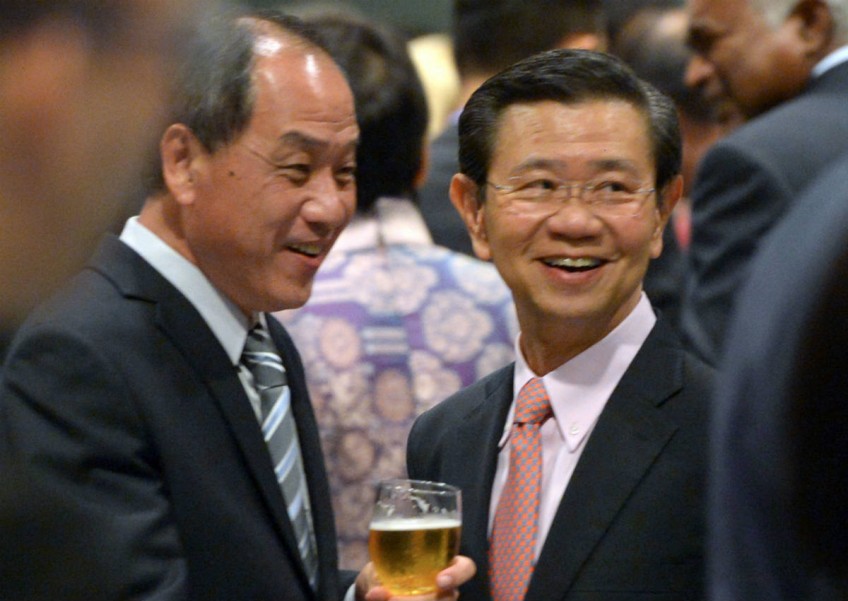Good politics should be 'nudging instead of censoring': Low Thia Khiang

PARLIAMENT
As Parliament sat for the fourth day yesterday, MPs resumed the debate on President Tony Tan Keng Yam's address made two weeks ago and also gave ministerial responses to parliamentary questions.
A good political system will prevent bad government and the failure of governance, said Member of Parliament (MP) Low Thia Khiang.
Speaking in Parliament yesterday on the debate about what is good politics, the Workers' Party chief gave the opposition's perspective, saying: "The outcome of good politics is not just good policy and ensuring no gridlock. That would be a narrow technocratic view of politics.
"The outcome of good politics is the fostering of a political system that is able to withstand shock and turbulence, including the unexpected collapse or slow corruption of the ruling party, to ensure the continuity of the nation as a united people."
The Aljunied GRC MP also said he agreed with the President's address where a call was made for the Government to look into how to "refresh" the political system.
The opposition party MP said national interest should be defined by "consensus" and the narrative "should not be shaped and monopolised by the ruling party".
Mr Low outlined the characteristics of "good politics" as being all-inclusive and giving space for differences in opinion to flourish without being marked as "disloyal and divisive".
He also said "good politics" should be nudging instead of censoring and should provide space for discussion between those with narrow political interests.
Mr Low added that "good politics" must also trust Singaporeans to be "independent, rational and wise social actors", and see value in having alternative parties and having the opportunities to develop.
"If this Government truly believes in preserving this shiny red dot, then the onus is on it to build a political system conducive to the growth of alternative parties, as well as the renewal of the ruling party," said Mr Low.
"Political value must not be narrowly construed and concentrated in one political party. That is too dangerous for a small state such as ours."
Mr Low also commended the SkillsFuture initiative, in which Singaporeans aged 25 and above get $500 in credit to pay for a range of courses to upgrade their skills.
He believed it leveraged on the "narrow interests" of individuals to pursue a "collective good" and utilised a "nudge policy" instead of the "usual carrot-and-stick approach favoured by the Government".
He added: "The whole policy is focused on empowering Singaporeans, instead of trying to direct or steer them to fit into the planned economy or the needs of corporations."
To further empower confident Singaporeans, Mr Low suggested that the "policy DNA" characteristic of SkillsFuture be applied to other areas like politics, schools and the small- and medium-sized enterprises sector.
[[{"fid":"525120","view_mode":"default","type":"media","link_text":null,"attributes":{"height":850,"width":1200,"border":"0","class":"media-element file-default"}}]]
HIDDEN OPPORTUNITIES
He said that because global conditions have changed, Singaporeans need to be nimble and experiment to find and seize "hidden opportunities".
"The red dot will no longer be red if its people turn pale in the face of challenges or when faced with intimidation. Hence, nurturing a confident Singaporean people is the way to ensure that our children and grandchildren will thrive," said Mr Low.
He ended by turning to Singapore's foundational ideas enshrined in the National Pledge.
"Mr Lee Kuan Yew said in 1996: 'When my colleague and I settled the words of our Pledge, we did not focus on our navel, or we would have missed that rainbow in the sky'," quoted Mr Low.
[[{"fid":"525079","view_mode":"default","type":"media","link_text":null,"attributes":{"height":850,"width":1400,"border":"0","class":"media-element file-default"}}]]
"No other nation in Asia has such lofty and progressive ideals, and it would be an injustice to the memory of our founding leaders and pioneer generation if we do not chase this ideal and keep focusing on the PAP navel instead," he said.
"Singapore needs to choose and make our own destiny, but we cannot depend on one political party or the government for charting and directing our path, if we are to be not just an exceptional, but an outstanding nation that is an example to all in Asia."
[[{"fid":"525179","view_mode":"default","type":"media","link_text":null,"attributes":{"height":400,"width":848,"border":"0","class":"media-element file-default"}}]]
This article was first published on Jan 29, 2016.
Get The New Paper for more stories.